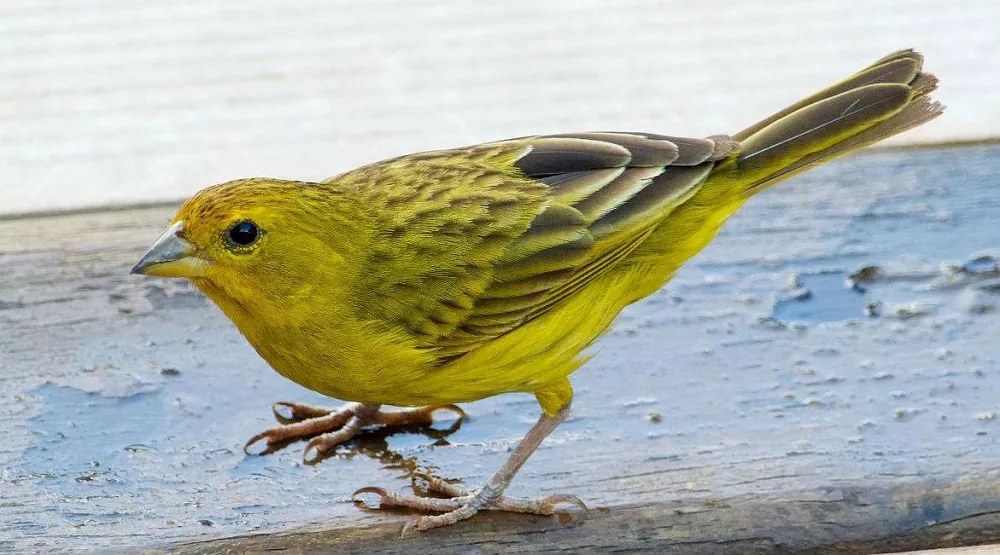The Atlantic canary, also known as the wild canary or Serinus canaria, is a small, delightful bird native to the Canary Islands. These charming birds are popular pets due to their melodious songs, vibrant plumage, and ease of care. If you are considering adding an Atlantic canary to your home, it’s essential to understand their specific needs and provide them with a suitable environment. In this comprehensive guide, we will outline the key aspects of caring for an Atlantic canary, covering everything from housing and nutrition to health maintenance and socialization.
Creating the Ideal Habitat:
Cage: Choose a spacious cage with dimensions of at least 18x18x24 inches to provide ample room for your canary to move, stretch its wings, and exercise. Ensure the cage bars are appropriately spaced to prevent escape or injury.
Perches: Provide various perches of different diameters to promote foot health and exercise. Natural wooden perches are recommended, as they help trim the canary’s nails.
Bedding: Use a layer of newspaper or bird-safe bedding material to line the cage bottom, facilitating easy cleaning.
Location: Place the cage in a well-lit area away from drafts, direct sunlight, and extremes of temperature.
Balanced Nutrition:
Canary Seed Mix: Offer a high-quality canary seed mix as the primary food source, readily available at pet stores. Ensure the mix contains a variety of seeds, including millet, canary grass seed, and hemp seed.
Fresh Water: Provide fresh, clean water in a sipper tube or shallow dish daily. Replace the water and clean the container regularly.
Fresh Vegetables and Fruits: Supplement the seed mix with small portions of fresh vegetables like spinach, broccoli, and grated carrots. Offer small amounts of fruits such as apples or oranges as occasional treats.
Cuttlebone and Mineral Grit: Place a cuttlebone and mineral grit in the cage to aid digestion and provide essential calcium.
Maintenance and Health:
Cage Cleaning: Clean the cage and accessories regularly to maintain a hygienic environment. Remove any uneaten food, droppings, or debris daily, and thoroughly clean the cage on a weekly basis using mild bird-safe disinfectants.
Bathing: Provide a shallow dish of water or a specialized bird bath for your canary to bathe in regularly. This helps maintain feather condition and keeps the skin healthy.
Veterinary Care: Schedule regular check-ups with an avian veterinarian to ensure your canary’s health. Seek professional advice if you notice any signs of illness, abnormal behavior, or changes in appetite or droppings.
Avoid Toxic Substances: Keep your canary away from toxic fumes, chemicals, and household plants that may be harmful to birds.
Socialization and Enrichment:
Companionship: Atlantic canaries are social birds, so consider providing a companion canary if you have the space and resources. Ensure the birds are properly introduced and compatible.
Mental Stimulation: Offer toys, such as swings, bells, and mirrors, to provide mental stimulation and prevent boredom. Rotate the toys regularly to maintain their interest.
Vocalization and Training: Encourage your canary’s natural singing abilities by playing soft music or providing audio recordings of canary songs. You can also train your canary to respond to basic commands or perform simple tricks using positive reinforcement techniques.
Conclusion:
Proper care and attention are vital for the well-being of your Atlantic canary. By creating an appropriate habitat, providing a balanced diet, maintaining hygiene, and offering socialization and mental stimulation, you can ensure your canary leads a happy and healthy life. Remember, each canary is unique, so observe their behavior closely and adapt their care routine as necessary. With proper care, your Atlantic canary will reward you with its beautiful songs and delightful companionship for many years to come.


 Facebook
Facebook  Instagram
Instagram  Youtube
Youtube 